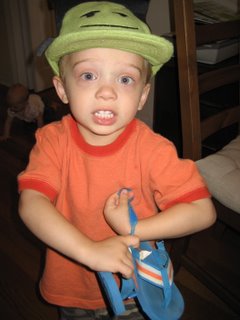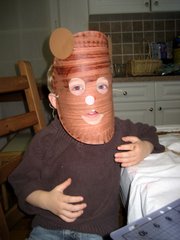I've been thinking a lot lately about my philosophy of preschool education. Why am I doing what I'm doing? Why do I teach Connor the way I teach Connor? How do I feel about preschool? What are the beliefs that drive me in educating my preschooler?
I'm going to attempt to answer these questions in writing so that I can free up some brain space and have a source to come to when I need reminding about the important things in educating Connor.
First and foremost, I believe that children are supposed to have fun when they're learning. I read an article in Newsweek (September 11 issue) about how competitive kindergarten and first grade are becoming. I started to try and summarize the article, but I can't do it justice. Basically, young children are being required to focus so much on academics at the ages of 5 and 6 that they're getting burnt out. It's too stressful! Young children have a natural love of learning and discovering. It's our job as parents and teachers to help them nurture that love of learning so that it doesn't die.
Second, I believe that all children learn at their own pace. Does this mean we sit back and let them do their own thing? No. This means we figure out how they learn and help them learn, understanding that they will have strengths and weaknesses. Particularly as toddlers and preschoolers, children develop differently. Their strengths and interests are already manifest in what they talk about and what they catch on to quickly. As parents and teachers we have to look for these things and use the teachable moments we have to expand their knowledge.
For example, Connor loves letters. He loves words. He picked up sign language amazingly quickly and well and then transitioned to talking brilliantly. He listens to words and thinks about how they're related to other words. He notices the way letters are formed and how they relate to each other. He hears a word once and stores it away in his little brain to use later, and he uses it appropriately most of the time. Language is Connor's "thing." So as his mother, it's my job to help him develop it. Not to force him to develop it, but to give him opportunities to learn more. To lovingly guide him in his discovery of language.
Does that mean that I ignore other areas of learning because they're not his favorite? No. He's still 3, so he loves learning anything. He just asks to learn about language. He loves learning about numbers and the way things work and people and relationships.
Which leads me to number three, a belief that has always guided the way I parent. I believe that kids can handle the answers to their questions. Okay, there are a few subject areas that I will not give him full details on until he's old enough. And I always give him answers in language that he can understand. But I give him the correct information when he asks me a question. I think this is one of the reasons he retains so much information. Because there aren't "holes" in the way he understands things. Because I tell him all about it.
For example, if he asks me what "chair" starts with I'm not just going to say, "Oh, you'll learn that later" or bypass the question or redirect him. I'm going to say, "chair starts with /ch/. When C and H are together in a word they sometimes say /ch/." And he'll file that away somewhere in his brain. He may remember it. But he probably won't. I don't expect him to remember it. I just want to give him the correct answer.
That's not the best example because maybe everyone would do that. And maybe most moms and dads do give kids answers like this. But I've heard parents who just bypass subjects or don't explain them in detail because they think their child isn't old enough yet. We can't underestimate what toddlers and preschoolers can understand. They are sponges and will soak anything up. So why not let them soak up all the information they can to help their brains develop?
There are other things I could write about now, but I've blabbed about the three big things I've been thinking about:
1. Learning should be fun, not stressful.
2. It's important to understand each child's way of learning and teach in ways that will best benefit him/her. It's equally important to figure out what a child is interested in and guide him/her in developing in that area.
3. Children can handle all the information we can throw at them. Don't hold back (except in inappropriate subject areas).
I'm sure I could sit here for hours and think of all the things I want to remember as I teach Connor. And I'm sure I'll edit this post or add to it later. But for now I just wanted to remind myself why I'm going to these efforts with Connor. Is it to make him the smartest 3-year-old around? Not at all. My goals are to help him love learning. To be involved in learning with him. To nurture his interest in letters and lanuage. To foster a love of math and other subject areas. To help him get used to a school routine. To make memories with him. And to help him socialize with friends (not
in preschool this year, but that's a main goal of mine).


